
17 Feb, 2015
Festival of India in Thailand: Multi-faith Sufi Gospel Musicians Hail Unity of Humanity
Bangkok – When Indian singer Sonam Kalra introduced the musicians of her Sufi Gospel Project troupe at this year’s inaugural Festival of India performance in Bangkok, she made it a point to highlight the team’s multi-faith composition. Two are Hindus, two Muslims and two Sikhs (including herself). One, a Christian, was absent at this performance.
She was sending a very simple yet effective message: The power of music, especially in a multi-cultural, -religious, -ethnic country like India, transcends parochial divides and indeed can be a major force to unite humanity. Teamwork raises the quality of their music to a new level. Each plays a different instrument but in unison, they leave their audience spellbound at the inspiring and motivating power of their performance.
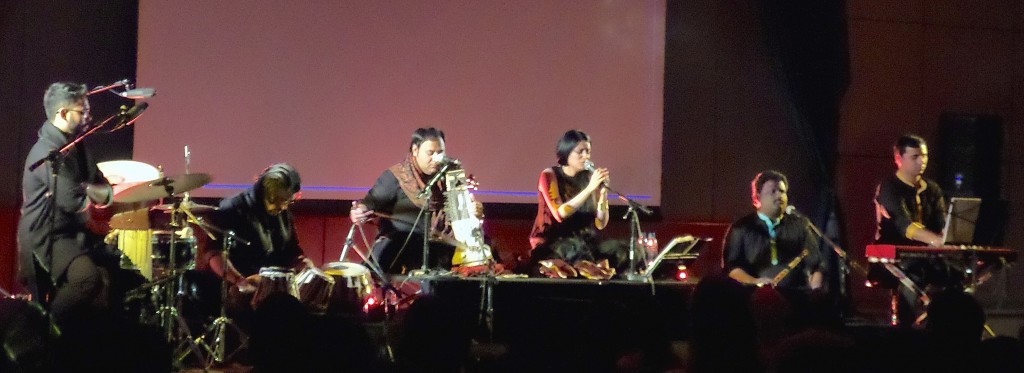 The Sufi Gospel Project musicians in action. (See more pictures below) |
The message was a perfect start to this year’s roster of Festival of India events due to be held in Thailand between 16 February – 25 May 2015. At the opening press conference, Indian Ambassador to Thailand Harsh Vardhan Shringla said that last year’s events had focussed on the more traditional aspects of Indian culture and heritage, while this year’s programme will highlight contemporary music, arts, fashion and literature. It will also commemorate the 60th birthday celebrations of Thai Princess Maha Chakri Sirindhorn, a scholar of Indian languages, culture and heritage, who will be presiding at one of the events.
The Ambassador said that India, like Thailand, is undergoing significant changes in its political, economic and social fabric, and that it was important for young Thais to understand this transformation through modern culture. The embassy is partnering with the Indian Studies Centre of Chulalongkorn University, Thailand’s foremost institution of higher learning, and Teamwork, famous for its annual Jaipur Literary Festival amongst other international events. Sponsors include Indorama, Aditya Birla Group, Tata Motors, Tata Steel, Kirloskar, Air India, Jet Airways, Galaxy Diamonds, CP Group and others. Except for one dinner event, all the others will be free to the public.
Teamwork Founder and CEO Sanjoy Roy set the theme of the inaugural Sonam Kalra Sufi Gospel Project performance by citing the role of contemporary culture as a demonstration of soft power. He said, “Culture allows you to look into the mind of a country, its philosophy, geography and history. In today’s world where we find very many issues with each other, it is important to come together to celebrate both our similarities and our differences but celebrate them with peace, love and equal respect.” He added later, “The arts allow you to create an opportunity to transcend these differences.”
Ms Kalra and one of her accompanying musicians, Ahsaan Ali Khan, a sarangi player, then sang a lilting, mellifluous hymn, Abide With Me, by the Indian Sufi poet Kabir which Ms Kalra said was the favourite of Mahatma Gandhi, the Father of modern India. The Hindi words “Moko kahan dhunde aray bande, main to tere mein hoon” (Why do you look for Me all over, when I am actually within you), leave no doubt about the message conveyed by the Sufi Gospel Project.
As this was Ms Kalra’s debut performance in Thailand, she stated in the media release, “There is a special relevance in the music and message of the Sufi Gospel Project in Thailand, because the ideologies of Sufism find a resonance in Buddhism’s teachings, which are beliefs of tolerance, and acceptance of all people to be equal.”
The performance itself was just mind-blowing, attended by a roughly 400-strong audience of Thais, Indian and foreign expatriates in Thailand. In addition to Ms Kalra and Ahsaan Ali Khan on the vocals, the other artistes were Amaan Ali Khan on the tabla, Prabir Sekhri on keyboard, Tarit Pal on the percussions and Rajesh Prasanna on the flute. All the young performers are in their thirties and forties.
The Sufi Gospel Project website describes it as an effort to blend all the voices of faith, through the use of song, music and the spoken word. It says, “Traditional western gospel melds with Indian classical sounds, and Indian spiritual texts are enriched by elements of western poetry to create a sound that touches every soul. Revealing that no matter what the language of the lyrics, or the ethnicity of the sounds, there is but one language, the language of faith. And that is the universal truth.”
Ms Kalra’s biodata says she had formal training in Indian Classical music under Shubha Mudgal and Sarathi Chatterji, and studied various genres of Western music including Gospel, Jazz and Opera under Hur Chul Yung and Ashley Clement. This diverse experience taught her that despite their different roots, different musical traditions have more in common than they differ. This realization was the genesis of The Sufi Gospel Project, which Ms Kalra launched in early 2011.
She is quoted as saying, “I first conceived this Project when I was asked to sing Gospel music to commemorate the birth centenary of the Sufi Hazrat Inayat Khan at the Inayat Khan Dargah in Delhi. I had sung Gospel in churches and at other music venues but for the Urz of Inayat Khan, I wanted to create a sound that blended the faiths. I belong to the Sikh religion and am often asked why I sing Gospel. My answer is always the same; because God has no religion. When it comes to faith and music, religion is not relevant. The music emerged through a collaborative and organic process, combining our musical abilities and collective improvisation and feeding off our diverse beliefs.”
She adds, “The Sufi Gospel Project is living proof that many different Hallelujahs can exist in harmony. This is the message we want to share through our music. It’s a new sound and quite unusual because we’ve blended traditional Indian instruments and sounds with age old Gospel hymns and Indian text and prayers. And because of the many languages and musical influences we’ve combined, everyone is able to relate to it.”
In her remarks to the audience, she also indulged in a bit of humour. As the group performs in various countries, her flautist gets caught at airport security because of the numerous pipe-like instruments he is carrying. Said Ms Kalra, “Yes, they can be mistaken for weapons of mass destruction because when you hear his music, you could die.”
All through the performance, the backdrop screen showed many key quotes from various Indian and Sufi scholars, thinkers and mystics, all testifying to the unity of humanity. All were translated into Thai. Here they are:
In my soul
there is a temple, a shrine,
a mosque, a church where I kneel.
Prayer should bring us to an altar
where no walls or names exist.
In my soul there is a temple,
a shrine, a mosque, a church
that dissolve in God
~Rabia Basri
++++++++++
In you I am lost
In you I am found
Of you I was born
To you I shall return
~ Shadaja
++++++++++
Are you looking for me?
I am in the next seat.
My shoulder is against yours.
you will not find me in the stupas,
not in Indian shrine rooms or temples,
nor in synagogues, nor in cathedrals:
not in masses, nor prayer meetings,
When you really look for me,
you will see me instantly
~Kabir
++++++++++
Come, Bulleya
Let us go to that place
Where people are blind,
so they can not discriminate
amongst us on the basis of
caste and creed.
Let us go together
to that place, Bulleya.
++++++++++
you will not find Him in temples
you will not find Him in mosques
You will not find Him until you
Break down the walls you see,
But never break another’s heart
for That is where God resides,
in you and in me
~Bulleh Shah
++++++++++
Truth can be spoken
in a thousand different ways,
yet each one can be true
-Swami Vivekananda
++++++++++
yes, I am also a Muslim,
a Christian, a Buddhist, and a Hindu.
~Mahatma Gandhi
++++++++++
In your light, I learn how to love.
In your beauty, how to make poems
You dance inside my heart,
where no one sees you
but sometimes I do,
and that sight
becomes this art
~Rumi
++++++++++
If my guru is standing beside me
And Ram is also by my side
If Allah too is present here
then whose child am I?
~Akal
++++++++++
I looked for myself
and found God.
I looked for God,
and found myself.
~Sufi proverb
++++++++++
Khusrau,
Strange is the river of love
Its waters flow upstream
He who enters, drowns in it
Yet he who drowns, gets across
~Amir Khusrau
++++++++++
For the travel & tourism industry, the Sufi Gospel Project, and other groups of the same genre, offer a unique opportunity to utilise and elevate the power of music as a unifying force. A half-hour or 45-minute performance by such groups at a conference opening ceremony can do more to set the tone, lift the spirits and uplift the doing-business atmosphere than another hackneyed speech by a minister, CEO, futurist or branding guru. Oftentimes, such amazing talent does not get the break it deserves due to lack of exposure and financial support. For tourism industry players with big budgets, sponsoring concert tours by groups such as the Sufi Gospel Project would do as much for their corporate-social-responsibility brand image as sponsoring sports competitions and football clubs.
It wouldn’t be bad for achieving global peace either.
Photographs of the performance and the media conference |
|
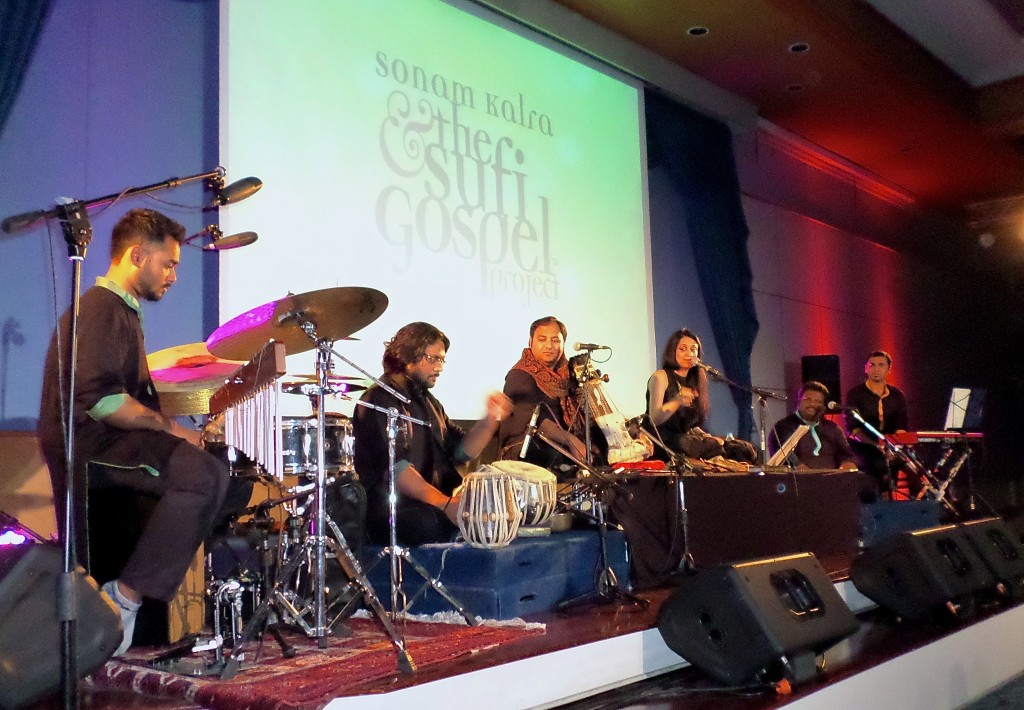 Ms Kalra introducing her musicians |
|
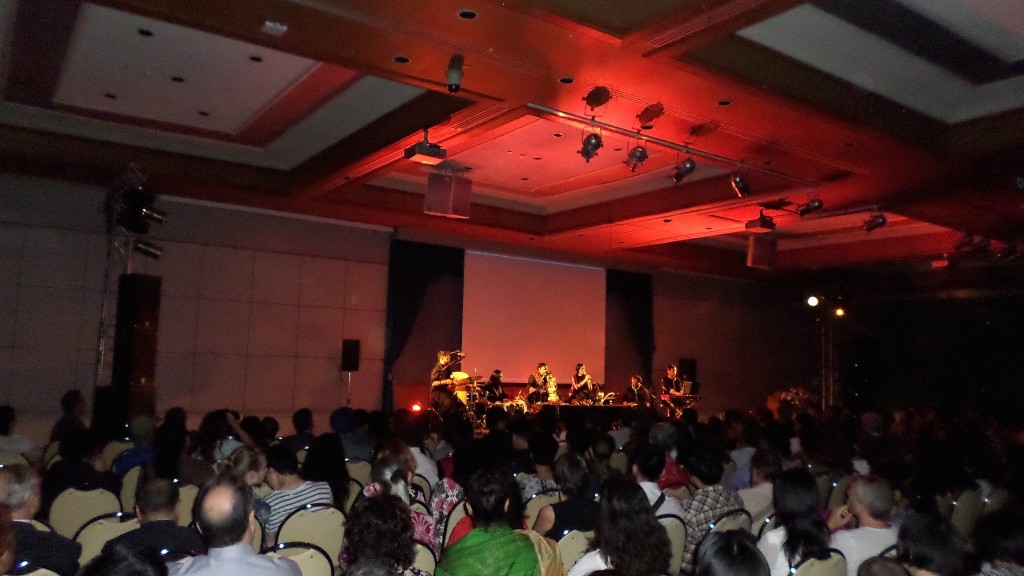 The Chulalongkorn University auditorium was house-full. |
|
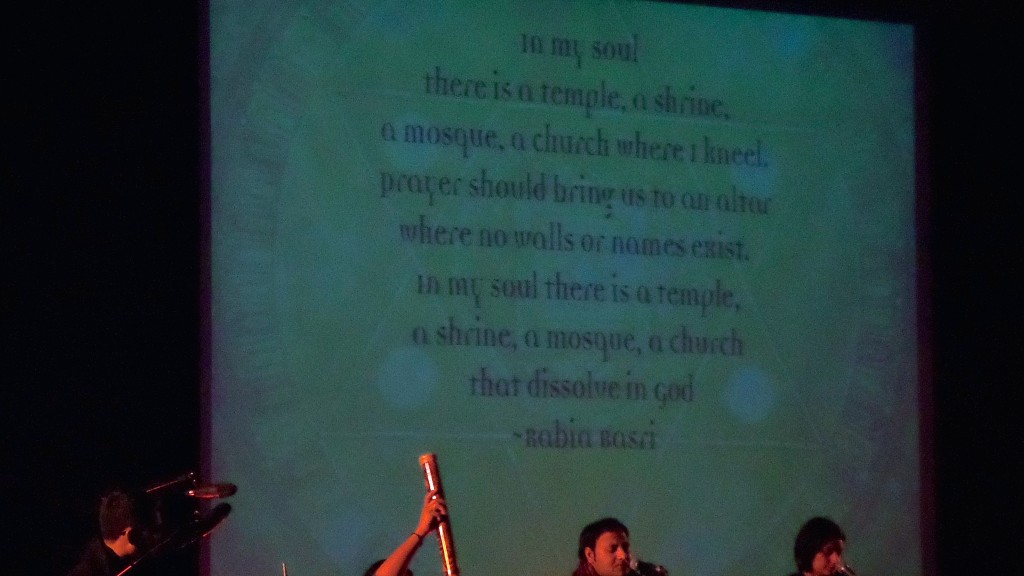 This backdrop with the messages gave new meaning to the music. |
|
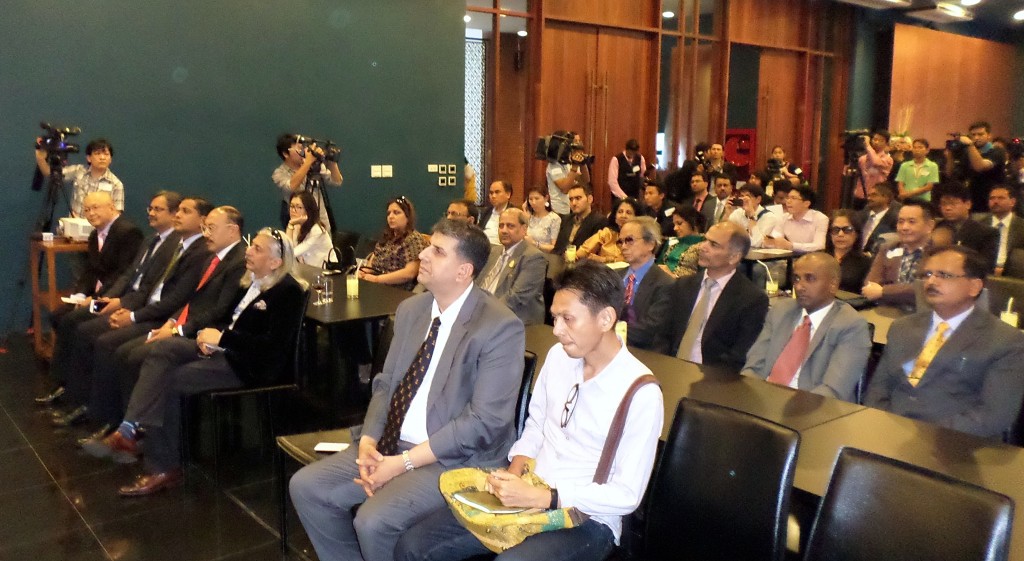 The turnout at the Press conference. |
|
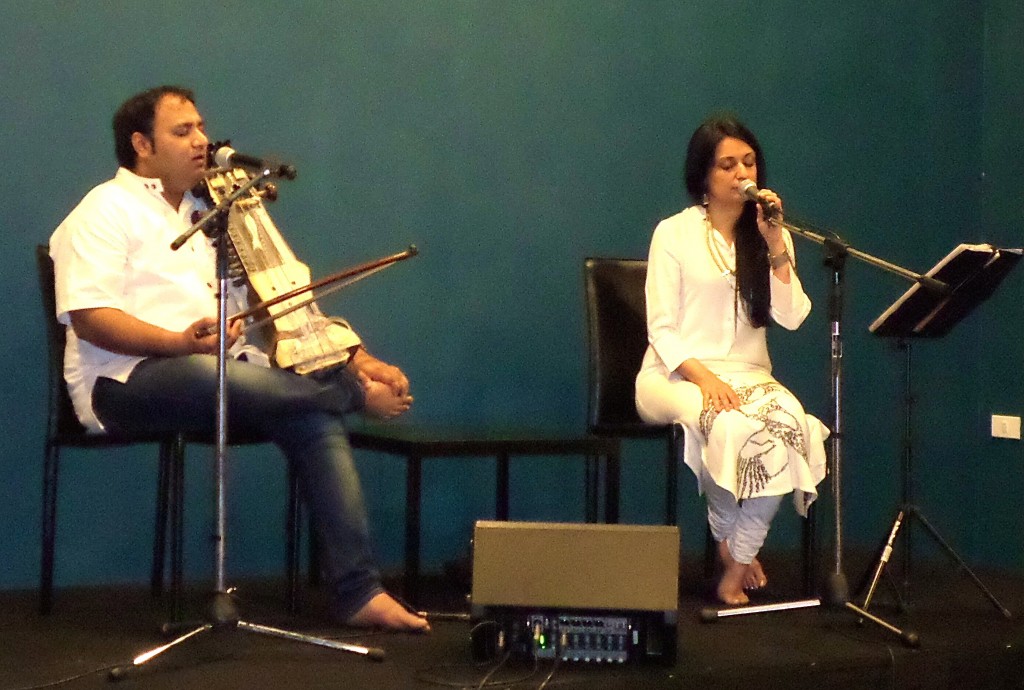 Ahsaan Ali Khan and Sonam Kalra giving the media a taste of what’s to come at the main performance. |
|
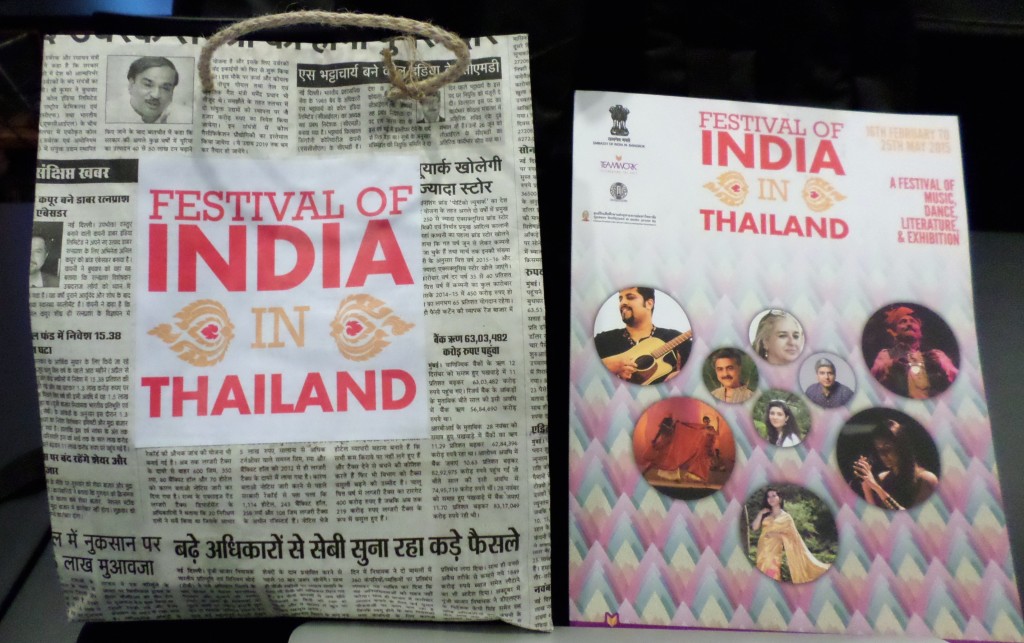 The media kit was contained in these bags made of old newspapers by an Indian NGO. |
|
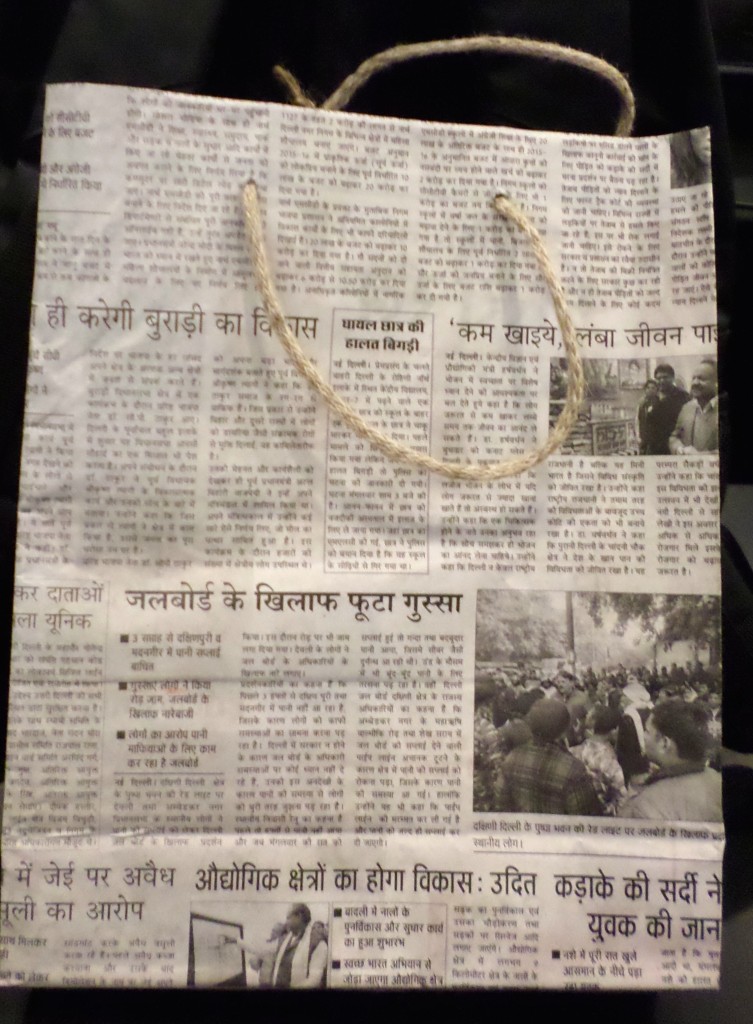 Nothing to do while waiting for the media conference to start? Catch up on some old news… |
|
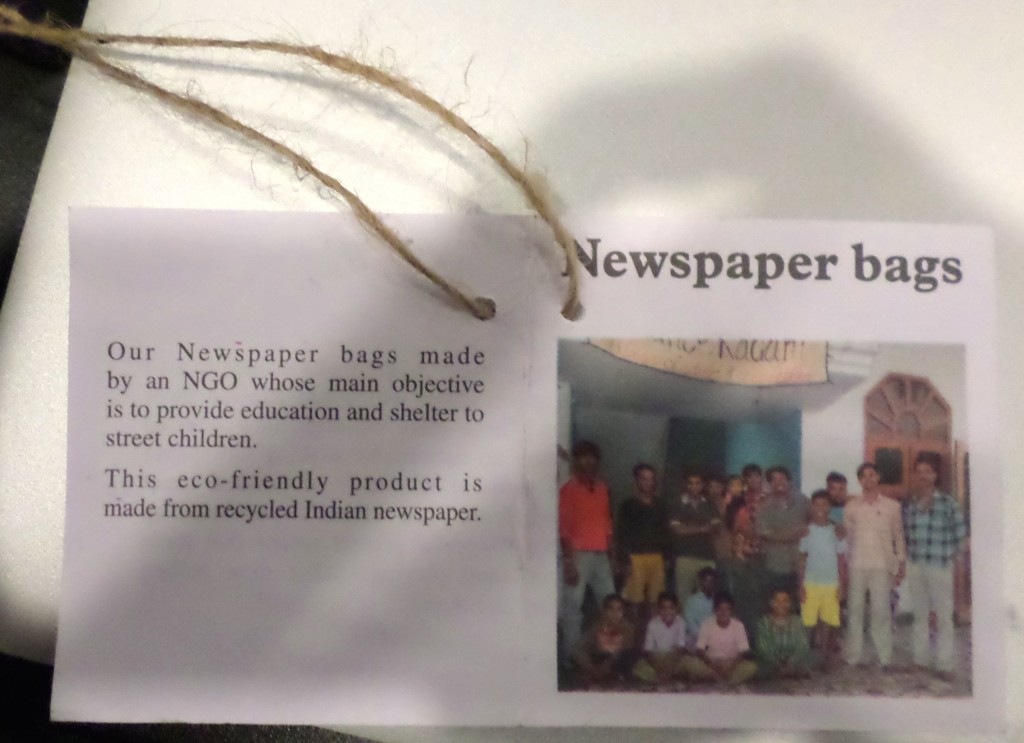 |
|
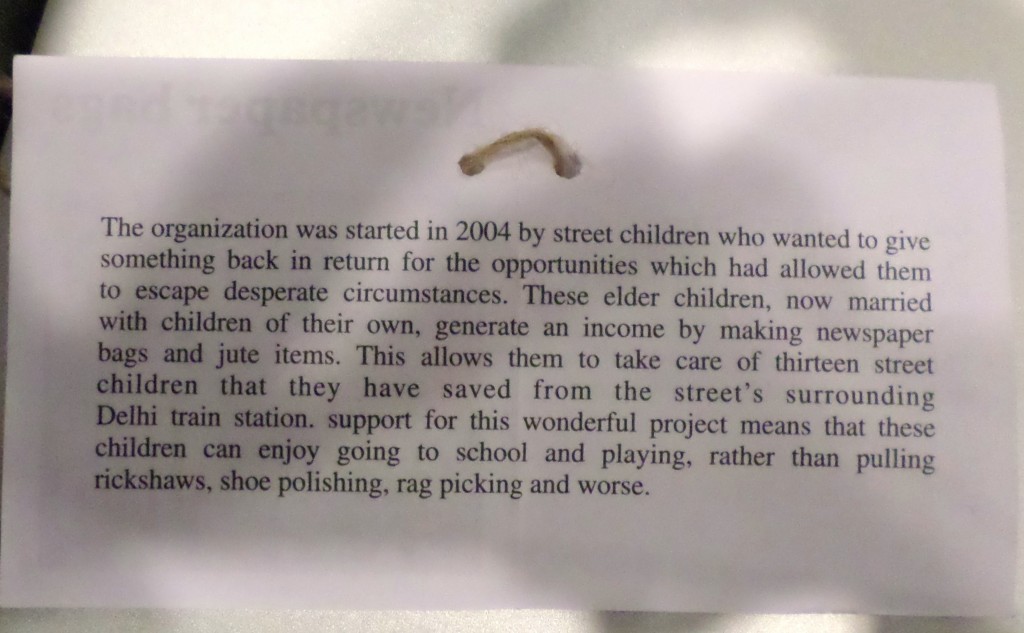 |



Liked this article? Share it!